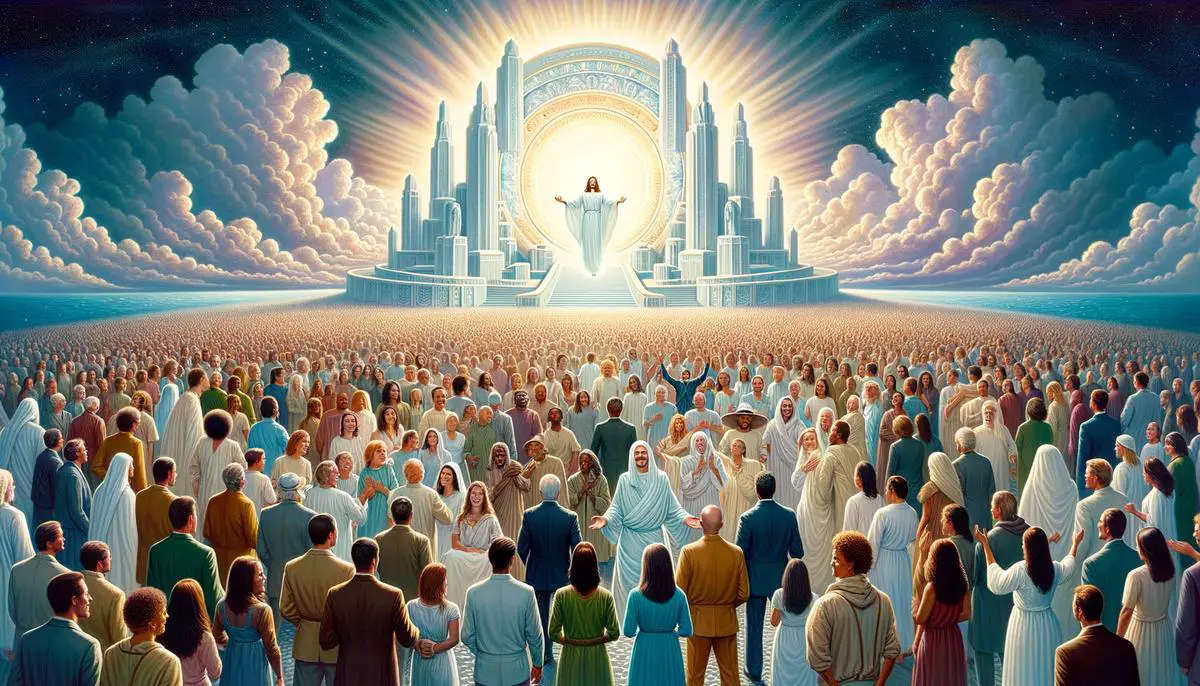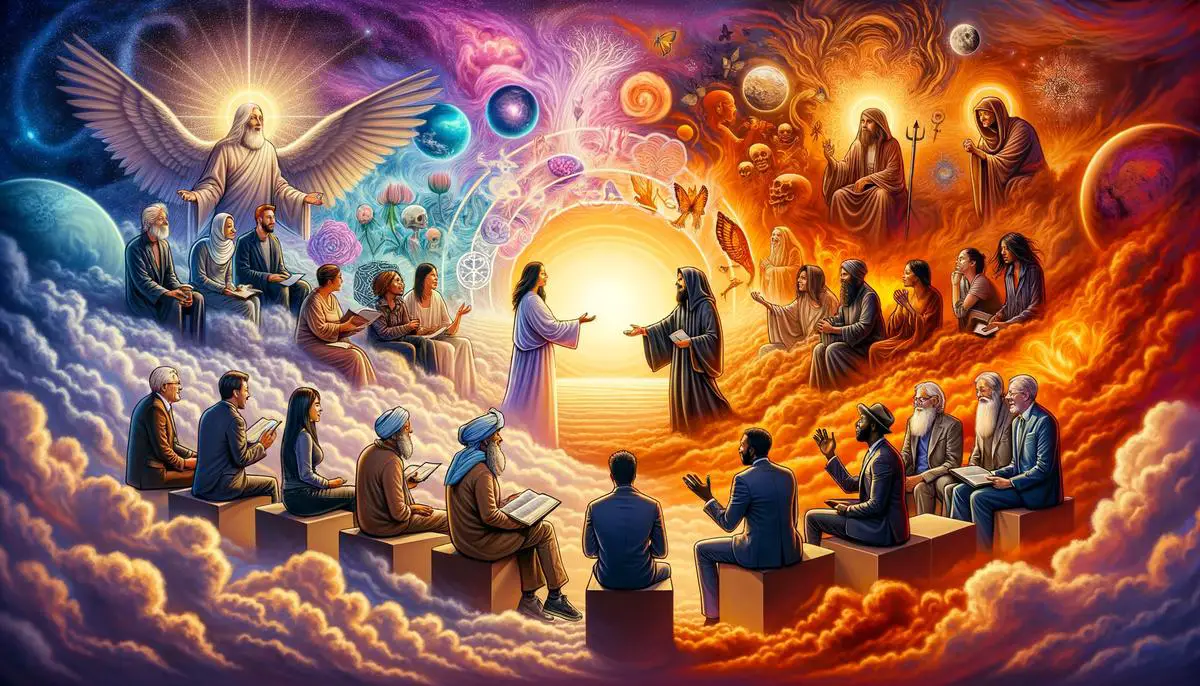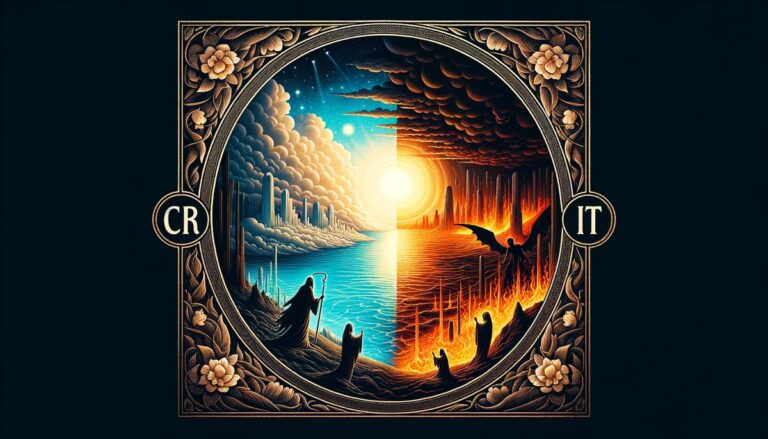Biblical Heaven
Heaven: A Realm of Endless Joy and Serenity
Heaven, as depicted in the Bible, is a realm where God dwells, marked by endless joy and serenity. Revelations 21:4 tells us, He will wipe every tear from their eyes. There will be no more death or mourning or crying or pain, for the old order of things has passed away.
This verse sums up the absence of suffering and the complete peace that characterizes heaven. The presence of God eradicates all forms of sorrow and discomfort that we experience in our earthly existence.
The physical beauty of heaven is beyond human comprehension. Revelations 21:18-21 describes it with streets of pure gold, gates of pearl, and foundations adorned with every kind of precious stone. This imagery conveys not just the unmatched magnificence of heaven but also its purity and eternal stability. The richness of heaven reflects God's glory and is meant to be shared in harmony by all who enter.
For those who lead righteous lives according to biblical teachings, heaven promises eternal life. John 3:16 states, For God so loved the world that he gave his one and only Son, that whoever believes in him shall not perish but have eternal life.
This shows heaven as an ultimate reward for faith and devotion, an eternal home with God. This life beyond death is an entirely new experience characterized by a direct relationship with the divine.
Heaven is also depicted as a place of unity and fellowship among believers. Revelations 7:9-10 describes a great multitude from every nation, tribe, people, and language standing before the throne, indicating the inclusive nature of heaven. This gathering reflects the communal aspect of heaven, where love and fellowship prevail over any earthly divisions.
In descriptions of Heaven, music and worship play central roles. Revelations 14:2-3 talks about a sound from heaven like the roar of rushing waters and a loud peal of thunder, which is the sound of harpists playing their harps. This portrays heaven as a place of celestial music and unceasing praise, underscoring the joy that pervades in the presence of divinity.
The physical and spiritual realms converge in heaven. While it's described in physical terms to relate to our understanding, its true essence lies in the spiritual experience it offers—a direct communion with God and a place where the soul finds its ultimate fulfillment and peace. Heaven stands as a promise of an eternal, joyous existence beyond the mortal confines of earth.

Biblical Hell
Hell: The Ultimate Destination for Those Who Reject God's Gift of Salvation
The concept of hell in the Bible is intertwined with themes of justice, retribution, and divine sovereignty. It is depicted as the ultimate destination for those who reject God's gift of salvation, where separation from His presence results in eternal suffering and remorse. This contrast to heaven's promise highlights the gravity of human choice and the everlasting consequences that follow.
Drawing from the Scriptural portrayal, one of the most harrowing images of hell is found in Revelation 20:10, where it states, And the devil who had deceived them was thrown into the lake of fire and sulfur where the beast and the false prophet were, and they will be tormented day and night forever and ever.
This depiction of fire and sulfur symbolizes not only physical anguish but also the purity of divine justice purging sin from existence. Hell is a place devised initially for Satan and his angels, underscoring the severe deviation from God's will that warrants such a fate.
Moreover, Matthew 13:50 says, And throw them into the fiery furnace, where there will be weeping and gnashing of teeth.
Such imagery invokes the grave emotional torment and despair experienced by the damned. The weeping and gnashing depict deep regret and suffering that stands in stark contrast to heaven's joy and peace. It is a reminder that hell is not merely a physical locale but a state of being devoid of God's comforting presence.
In another scripture, 2 Thessalonians 1:9, those who stand opposed to God will suffer the punishment of eternal destruction, away from the presence of the Lord and from the glory of his might.
This passage points to the spiritual torment of hell—eternal separation from God. For humanity, created to be in relationship with the Creator, this severance represents the ultimate spiritual demise.
Hell is also characterized as a place of fairness and justice, where each individual faces consequences directly reflecting their earthly choices. Revelation 21:8 details a list of unrighteous acts leading to damnation, emphasizing that hell embodies divine justice, meting out punishment tailored to sin's severity and rejecting repentance.
While bible verses about hell may provoke fear, they are a call toward reflection and transformation. They encourage consideration of life's moral choices in light of eternal dimensions, encouraging a path aligned with righteousness and communion with God. Hell is depicted as a dark existence plunged in despair and agony, mirroring the profound themes of freewill, justice, and divine sanctity enveloping the biblical narrative.
Eternal Judgment
Eternal Judgment: The Everlasting Fate of Souls
The Bible communicates unequivocally about the permanence of eternal judgment, underlining a doctrine whereby humanity must confront the reality of an afterlife – either in eternal bliss with God or enduring separation. This judgment determines the everlasting fate of souls, predicated on lived experiences, choices made, and the state of one's heart in relation to God. The paramount criterion revolves around acceptance of Jesus Christ as savior, fostering reflection on the significance of faith, repentance, and obedience.
According to Scripture, Jesus plays a pivotal role in the dynamics of salvation and judgment. John 5:22 affirms, Moreover, the Father judges no one, but has entrusted all judgment to the Son,
emphasizing that Jesus is central to the process of divine judgment. This junction between humanity and divinity accentuates God's love, marking the sacrifice of Jesus as the accessible pathway toward redemption. Jesus embodies both the ultimate judge and the provider of salvation, offering forgiveness to those who embrace Him and acknowledge His sacrifice.
Matthew 16:27 states, For the Son of Man is going to come in his Father's glory with his angels, and then he will reward each person according to what they have done.
This scriptural declaration illustrates that actions – embodying both deeds and faith – play critical roles. Faith, manifesting through actions reflective of Jesus' teachings, becomes the yardstick, aligning beliefs and behaviors with divine expectations.
Repentance operates as a hallmark in determining one's afterlife pathway. Acts 3:19 asserts, Repent, then, and turn to God, so that your sins may be wiped out, that times of refreshing may come from the Lord.
The act of repentance, turning away from sin and toward God, symbolizes a meaningful transformation pivotal for salvation. This spiritual renewal embodies a return to God's embrace, underscoring His mercy and readiness to forgive those who genuinely seek reconciliation.
The concept of faith is intricately woven into the fabric of eternal judgment. Ephesians 2:8-9 conveys, For it is by grace you have been saved, through faith – and this is not from yourselves, it is the gift of God – not by works, so that no one can boast.
Faith provides the foundation upon which the believer's relationship with God stands, a gift manifesting salvation not accountable to human merit but upon divine grace. It underscores that salvation cannot be earned, but is generously extended by God to those who believe in Jesus.
These themes elucidate a biblical portrayal of eternal judgment as multifaceted, entwining humanity's actions with the profound access to salvation through Christ. It accentuates an existence marked by choices with eternal implications and highlights God's justice harmoniously balanced with His inexhaustible grace. As believers tread upon Earth with sights set upon eternal life, the paradigms of faith, repentance, and a life lived in Christ's emulation form the compass directing towards their eventual dwelling – an eternal alliance with the Creator or relegation to the depths of separation.

Afterlife Visions
The Afterlife in Christianity and Islam: Converging and Diverging Narratives
The afterlife, a concept entwined with the mysteries of faith and existential continuity beyond the temporal realm, stands at the heart of many religious traditions. Each presents a unique tapestry of beliefs, characterized by distinct visions of eternity, reward, and recompense. Comparing the Biblical descriptions of heaven and hell with those found in other religious texts, particularly the Qur'an, unfolds a fascinating dialogue between converging and diverging eschatological narratives.
In Christianity, as articulated in the Bible, heaven and hell are depicted as definitive final destinations reflecting the culmination of a life's worth of choices aligned with or against divine precepts. Heaven is portrayed as an eternal abode of joy, peace, and fellowship with God, a reward for faith and righteousness. Hell emerges as the realm of separation from God, associated with torment and despair, for those who repudiate divine grace.
The Qur'an, Islam's holy scripture, similarly articulates a dichotomy between paradise (Jannah) and hell (Jahannam), reserved for the faithful and the wicked, respectively. Jannah is depicted as a place of splendor, abounding in gardens beneath which rivers flow, an eternal residence of bliss for those who submit to Allah and act righteously. Jahannam is portrayed as a place of fiery torment and agony for those who deny Allah and lead a life of sin.
One significant point of similarity lies in the ethical underpinnings that determine one's eventual placement in either realm. Both texts emphasize a final judgment predicated on one's deeds and faithfulness. Faith in God's sovereignty, adherence to His commandments, and an elevation of charity and justice serve as bedrocks for earning eternal bliss in both traditions.
However, notable differences emerge in the descriptions and underlying theologies of the afterlife. In Biblical teaching, heaven is often associated with the presence of God and direct communion with Him. The concept leans toward reuniting with the Creator, where physical descriptions serve to underscore the spiritual fulfillment derived from this reunion.
In contrast, Islamic traditions as expounded in the Qur'an offer elaborate physical depictions of both paradise and hell, frequently invoking sensory imagery to delineate the extremes of reward and punishment awaiting the soul. The emphasis here intertwines spiritual fulfillment with physical gratification or suffering, making the outcomes of one's earthly life starkly vivid.
Another distinction manifests in the mechanism of intercession. In Christianity, Jesus Christ is portrayed as the pivotal figure through whose sacrifice and subsequent judgment all are granted access to heaven or relegated to hell. This emphasizes salvation through grace and faith in Jesus's atoning sacrifice. The Qur'an recounts that while intercession is possible, it is exclusively reserved for whom Allah permits on Judgment Day, highlighting a direct accountability to God's sovereign decree.
Despite these differences, both texts envisage the afterlife as a reflection of divine justice — a fundamentally moral universe where ultimate outcomes correspond to earthly lives lived in accord or dissonance with a divine mandate. Whether through the lens of Christian scripture or Islamic thought, afterlife beliefs stir individuals toward moral consideration and spiritual reflection. The orientations of these religious texts present a curated dialogue with eternity — a conversation that beckons adherents of both faiths toward righteousness, offering solace or warning in painting the eternal destinies that await beyond the veil of mortal existence.
Theological Interpretations
The Evolution of Christian Thought on Heaven and Hell
The theological tapestry woven by centuries of Christian thought on heaven and hell showcases a remarkable evolution. This journey through time reveals an expanding and deepening understanding of the afterlife, reflecting both cultural shifts and advancing theological discourse. From the early church fathers to medieval theologians and onto contemporary scholars, each epoch has contributed uniquely to the kaleidoscope of beliefs surrounding heaven and hell, influencing both doctrine and the individual believer's perception of the eternal.
In the nascent stages of Christian theology, writings from early church fathers like Augustine and Origen manifested a blend of scriptural interpretation and philosophical inquiry. Origen, with his allegorical leanings, introduced the idea of apocatastasis, a universal reconciliation where all souls eventually achieve salvation, suggesting an early fluidity in the conceptualization of hell. Augustine of Hippo underscored the dualistic finale of eternal life or damnation based on divine justice and human choice. These early interpretations were foundational, framing the afterlife as the ultimate destination shaped by divine grace and personal merit.
As time marched into the medieval period, an era delineated by figures like Thomas Aquinas and Dante Alighieri, the intellectual landscape surrounding heaven and hell attained new depths. Aquinas, through his synthesis of Christian doctrine with Aristotelian philosophy, elaborated on the nature of the soul's joy in heaven and its despair in hell. Meanwhile, Dante's "Divine Comedy" rendered a vivid, allegorical map of Inferno, Purgatorio, and Paradiso, encapsulating the era's intricate theology in a tapestry of poetic imagination. The medieval period crystallized heaven and hell not just as destinations but as deeply moral landscapes, reflecting the virtues and vices of humanity.
Transitioning into the modern age, the Enlightenment and subsequent theological liberalism encouraged a more metaphorical and less punitive interpretation of hell, emphasizing God's love over retributive justice. Scholars like C.S. Lewis imagined hell not as fiery pits but as states of self-imposed separation from God. In parallel, views of heaven shifted toward an understanding of a relational and experiential communion with God, edging away from overly material portrayals. These modern interpretations reflect a broader shift towards an inclusively nuanced, morally and existentially rich conception of the afterlife.
Throughout history, each era's articulation of heaven and hell has mirrored its prevailing philosophical inquiries, anthropological views, and theological priorities. What remains consistent is the role of the afterlife in eliciting moral reflection and aspiration towards a life conjoined with the divine will.
Whether through Augustine's reflections on divine justice, Dante's poetic musings on the


